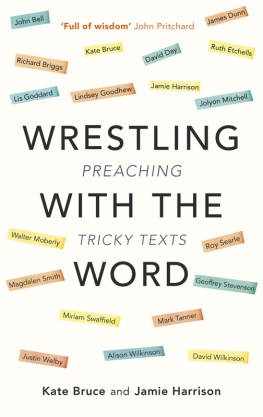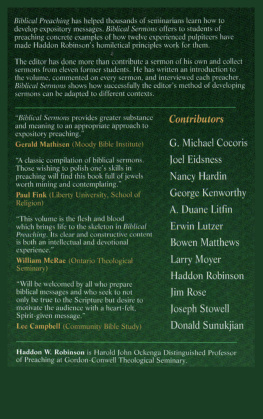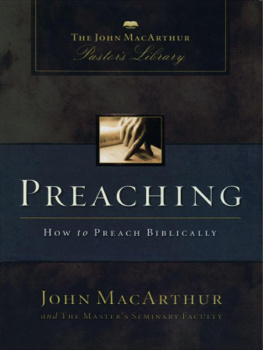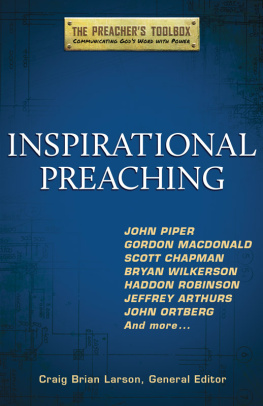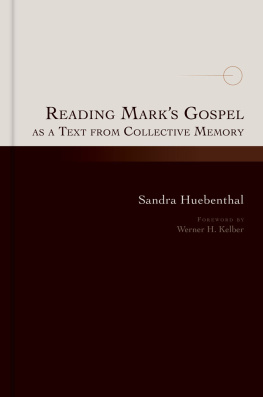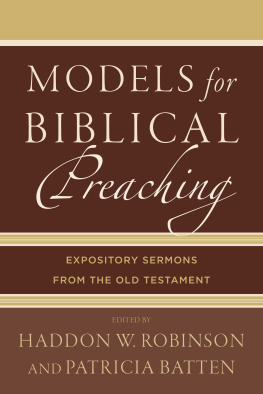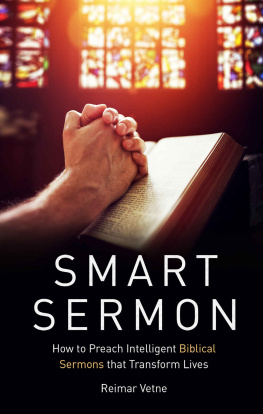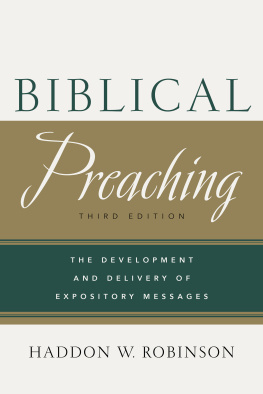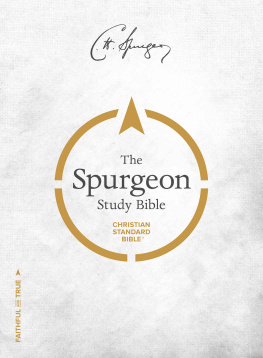Copyright 2021 Robert C. Tannehill. All rights reserved. Except for brief quotations in critical publications or reviews, no part of this book may be reproduced in any manner without prior written permission from the publisher. Write: Permissions, Wipf and Stock Publishers, W. th Ave., Suite , Eugene, OR 97401 .
W. th Ave., Suite
Foreword
The mid-twentieth century officiated over the funeral of printed collections of sermons. Until this time, it was common to find several volumes of sermons by well-known preachers and scholars in Christian households. It represented a devotional practice through which readers expanded their understanding of the gospel beyond the sermons they heard weekly by their own beloved pastors.
Publishers did not just decide the practice of reading sermons had gone on too long. No, the death of sermon collections paralleled the shrinking influence of the church in general and the expanded access to sermons beyond ones own church due first to radio preachers and later televangelists. Today the deluge of public sermons is even more evident on the internet, with many preachers live-streaming their sermons on Facebook Live and YouTube, especially since the Covid- pandemic began in the spring of 2020 .
The problem with these public sermons is that so many of them are... well... so bad. Not all, of course. Some represent the faithful efforts of faithful preachers to speak a relevant word to their congregations and the wider world. But others represent a self-help gospel that is really self-serving. Some abuse the biblical text, while others abuse the hearer. Some lack an explosive imagination, and others lack a grounding theology.
My purpose here is not to pick on preachers willing to proclaim the gospel in public ways. Indeed, some of my sermons are online but do not measure up to my own critique. Instead, my purpose is to set up a contrast to what follows in this book. The decision of Wipf & Stock to publish a collection of written sermons may seem quaint and outdated. Really, a book of sermons when anyone with a cell phone can do a quick web search and can, in an instant, find hundreds of sermons on any given topic or biblical text?
Yes! The collection of sermons in this printed volume are worth pausing and reading carefully as opposed to listening to a sermon while honking the horn during rush hour or watching a sermon while dicing carrots for the evenings stewpot. Slow down and give Robert Tannehill a chance to bring you into dialogue with Scripture in a way that leads to new insights concerning the relevancy of ancient texts for contemporary life.
I knew Dr. Tannehill long before I had the chance to meet him. As a pioneer in literary readings of the Gospels, he offered scholars and preachers (including me!) new ways of reading Mark and Luke-Acts as unitive plots. His work has informed mine in many ways, and I have the footnotes in my dissertation on Acts and my forthcoming commentary on Mark to prove it. I have known Dr. Tannehill as a scholar.
I did not, however, know him as a preacher until I was blessed to read this collection of sermons. And, oh, what I have been missing! The sermons in this book span decades of Dr. Tannehill stepping away from teaching at the lectern to proclaiming the good news from the pulpit. A quick glance at the sermons shows that he excels in both teaching and proclamation.
As a biblical scholar concerned with proclamation, he models a critical exegetical approach that demonstrates the power of the ancient text to speak to the twenty-first century so long as we do not domesticate it. He warns of such domestication in one of his sermons:
A family with small children was sitting near [my mother] in church. The young daughter got fidgety toward the end of the service. Finally, she pulled out the pew Bible, opened it, and looked at it. Then she said to her mother, This book says I need a snack.
Our use of Scripture can be just as self-serving. We have various ways of making Scripture fit our desires. Some of these ways are nave; some are sophisticated. Either way, the Bible loses its status as an independent and disturbing witness that calls us to account. The danger is that we will only hear what we want to hearthe equivalent of This book says I need a snack.
The careful reading this collection invites, however, offers a full meal of serious nourishment, not some sugary snack. These sermons invite the reader to consider what it means to live well as a person of faith. Be clear, though, they paint no pop psychology picture of wellness. Instead, they use a chisel of critical exegesis to carve out of Scripture a sculpture of a life of deep meaning, a life that makes a difference, a life fueled by and grounded in the creative power that sustains our world of goodness and beauty.
This picture of a life of meaning is not antiquated as one might expect for a print book collecting sermons by an octogenarian. This is preaching for the twenty-first century church. The preacher addresses pastoral concerns such as anxiety, ways we make Jesus too small, conflict in the church, and grief. He deals with theological issues such as the meaning of incarnation, the relation of science and religion, questions of theodicy, the paradox of the cross, and the nature of ministry. And he speaks frankly and prophetically on social justice matters involving the environment, racial justice, the abusiveness of the prosperity gospel, economic systems that favor the elite, patriarchy, the need for restorative justice in the face of the corruption of the criminal justice system, and the inclusion of LGBTQ persons in the church.
Across this landscape of issues, Tannehill names the problems of contemporary life and the wider world with fierce honesty, but he also offers his hearers and now his readers the optimistic hope that comes with living in faith. What he says in his sermon, Transformed by Good News, could be stated as the theme for his whole corpus of proclamation:
The good news reveals a critical opportunity. It calls us from the smallness of our ordinary lives to participation in a greater movement. That movement involves us deeply in the lives of others, in their struggles and hopes. It involves us in a movement for justice and reconciliation, for a community of love, a movement empowered by the rule of God.
For Tannehill, the ordinary life lived well in extraordinary ways is not just a call from God, but a real possibility that God provides us out of Gods grace.
O. Wesley Allen, Jr.
Lois Craddock Perkins Professor of Homiletics
Perkins School of Theology, Southern Methodist University.
Acknowledgments
An earlier version of God and Evolution appeared in the Delaware Gazette, Jan. , 2019 . Used by permission.
I want to acknowledge and thank those who have contributed to my life journey: my parents Rev. F. V. Tannehill and Cecelia Tannehill, my professors at Hamline University and Yale Divinity School, my colleagues and students at Methodist Theological School in Ohio, creative scholars in New Testament studies, other creative thinkers who have deepened my understanding of the world, the people and pastors of William Street United Methodist Church, friends and co-workers in various social ministries in Delaware, Ohio.



